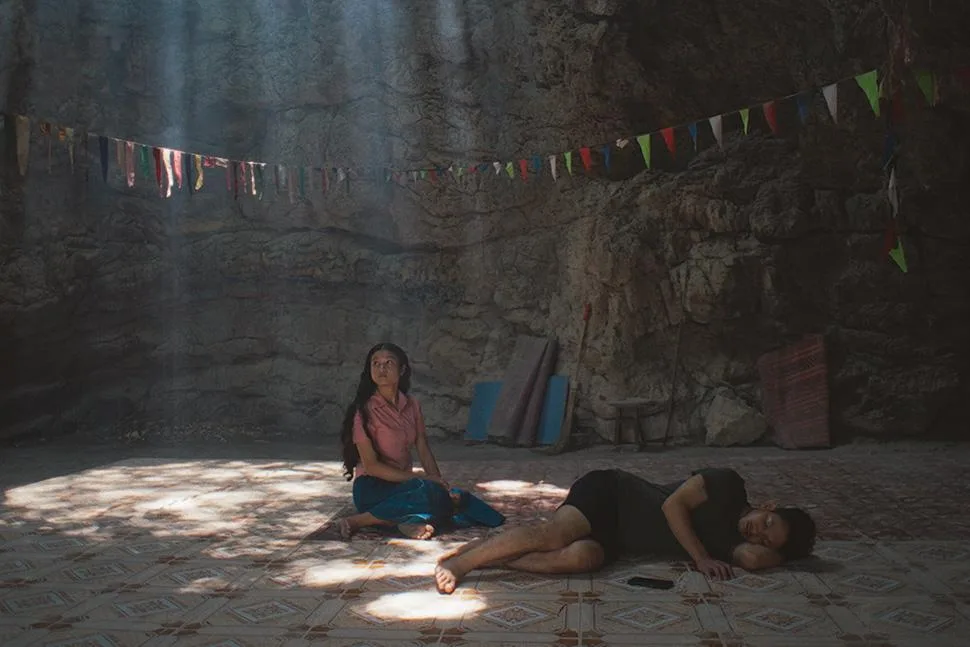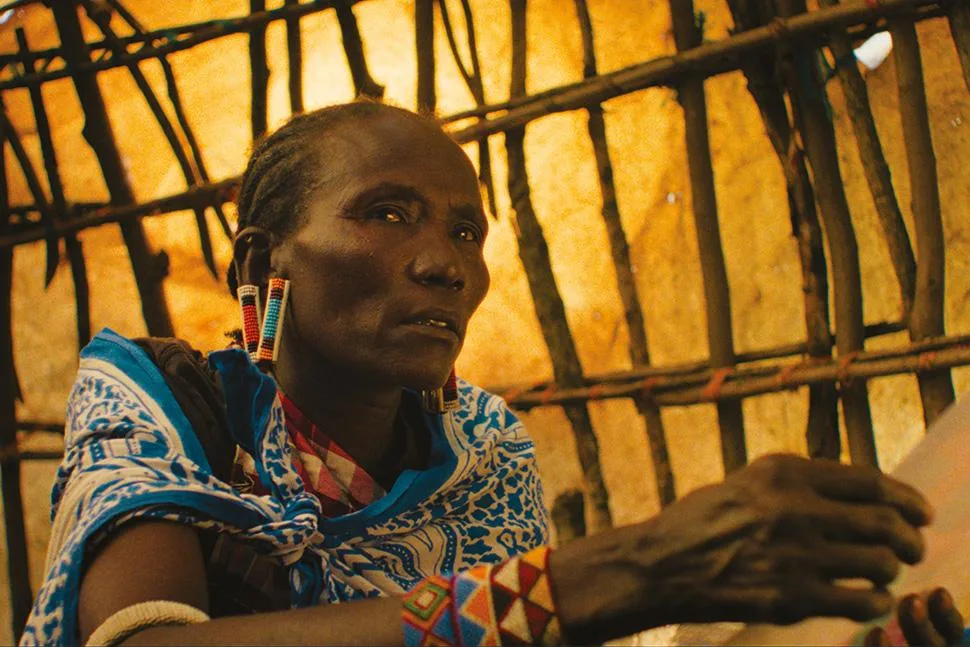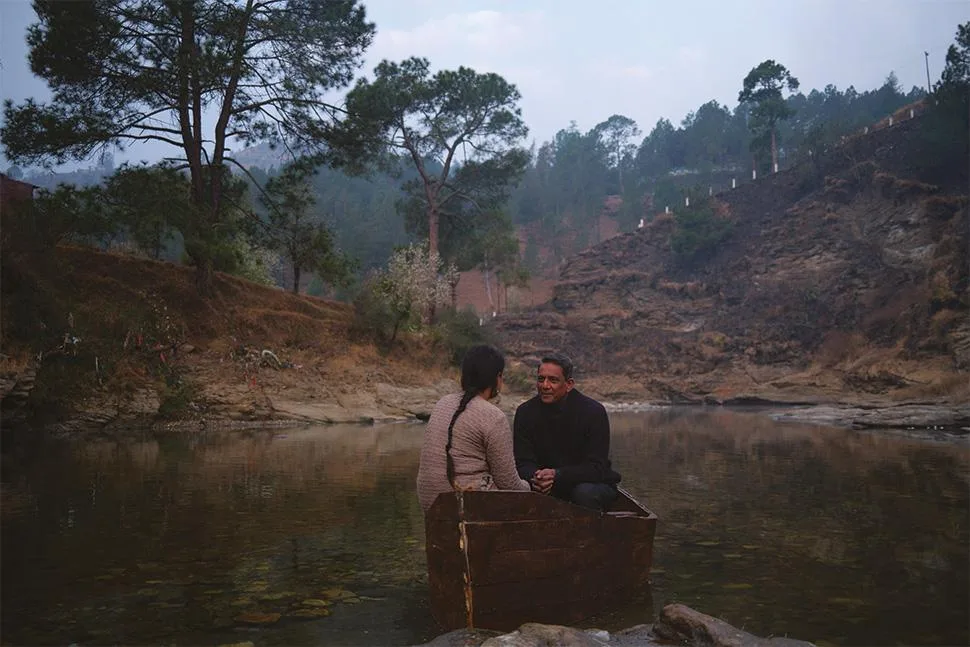Since 2015, with 2020 skipped on account of COVID, I’ve been honored to participate in the Biennale College panel. Every year, after going through over a thousand proposals, the College awards 250,000 Euros to, in this year’s case, four filmmakers. Or eight, rather—directors and their producing partners. After workshopping in Venice for a spell, they are sent out to deliver finished films to the festival ten months hence.
The program has always presented films with strong perspectives, individual voices that aren’t always well-presented by the mainstream, etcetera. I remember one of the first College films I saw, Anna Rose Holmer’s “The Fits,” zapped me right between the eyes. And of course Lemohang Jeremiah Mosese’s galvanic “This Is Not a Burial, It’s a Resurrection” went from the College to international acclaim, and a Criterion edition.
I have to say, though, this year it has outdone itself. The films are all outstanding, nothing to quibble about or take issue with. In the past, I’d have bones or nits to pick with the filmmakers, whom I and the other panelists would meet at a conference in person at the Biennale. This yea,r all I could do was offer them my heartiest thanks and congratulations. They seemed to take it well.
The panel was convened and moderated by the great all-around critic and particularly renowned Bergman scholar Peter Cowie. One of the greatest gifts my work here has afforded me is a warm friendship with Peter and his lovely wife Françoise. Chris Vognar, who just quit Texas to work as the pop culture correspondent for the Boston Globe, Stephanie Zacharek, the film critic for Time magazine, Finnish film scholar Sara Ehnholm Hielm, and longtime Chicago Tribune critic Michael Phillips are panel colleagues and pals of long standing. New to the panel is Louise Dumas of the legendary French film mag Positif. And we were joined, as is customary, by Savina Neirotti, the head of the College program, who provides crucial context and perspective. But the critics largely agreed with my own assessment that this year’s films were especially strong.

From Cambodia comes “Becoming Human,” directed by Polen Ly and produced by Daniel Mattes, a beguiling film that’s kind of a combination of Thai Minh-Li’s “Goodbye Dragon Inn” and Wim Wenders’ “Wings of Desire.” Savorn Serak plays Thida, the guardian angel of a decrepit old movie house that’s about to be torn down. Pisseth Chuun is Hai, a corporeal living guy who detects her presence. Thida falls in love with him, which forces her to choose between remaining a spirit and undergoing a rebirth. If she goes with the latter, her time with Hai will end. The cinematography is by Son Doan, who also lensed the striking recent film “Viet and Nam;” the images here lean hard into the beauty of decay. The film deepens when we learn how harrowingly Thida’s life ended, and how hard it was before that. The movie, like all the selections of the colleges this year, has a very solid grounding in its respective country, and LY has found an apt and moving metaphor for the tragedy of Cambodia’s last 70 years.
The India/ Sri Lanka co-production “Secret of a Mountain Serpent,” directed by Nidhi Saxena and produced by Vimukthi Jayasundara, combines magic realism with social history and commentary. It tells of a schoolteacher whose husband is fighting in the Kargil war. “Does love remain? Even when lovers are distant?” These are the film’s questions. A man from outside her village arrives and sets the place on its ear — shades of Pasolini’s “Teorema” — and his presence seems to manifest the arrival of the mythical title serpent. The movie revels in a stillness that is akin to what you get sometimes in Tarkovsky…but it’s very culturally specific, not indebted to the Russian maestro’s point of view as such. Every shot is beautiful. One view of co-star Adil Hussein reflected in water reminded me of Alain Delon’s magisterial entrance in Jean-Luc Godard’s underseen 1990 master piece “Nouvelle Vague.” A film both enchanting and haunting, suffused with magic and sadness.

“One Woman One Bra,” from Kenya, directed by Vinch Nchogu and produced by Josh Olaoluwa, is a film that entirely lives up to its title, because it has to. The filmmakers take advantage of the freedom the Biennale College program offers — the opportunity to tell a story not often approached in their mainstream culture. That story is first an examination of a patriarchal society: a village that is shaken when a woman, Star (Sarah Karei), becomes the holder of a property deed after her father’s death. This isn’t done. Exploring her past, she is told that she was the cover subject of a photo book by a white Western photographer. She tracks the fellow down and is met with infuriating condescension. That’s just one aspect of the film’s strong narrative through line, whose thrust is, yes; “Bringing bras to the women of Sayit. This is a game-changer. “
“Agnus Dei,” directed by Massimiliano Camaiti and produced by Giovanna Nicolai and Olivia Musini, is this Catholic boy’s favorite picture, and if you see it, you’ll know why. The title translates to “Lamb of God,” of course, and the documentary, without recourse to voiceover or talking head interviews, follows the lives of a couple of lambs that are born in a monastery and cared for by a group of nuns. (The monastery is of Saint Cecilia, in Trastavere, which has existed since the Sixth Century.) Spare and simple in format—it’s shot in the square-ish 1.37 Academy ratio—it’s also elegant and humble at the same time. And what it leads up to is heartening, likely to move all but the most violently anti-clerical of viewers.
More than ever, I hope these films will soon be available to be seen by you Ebert readers — they deserve it. I mentioned Michael Phillips’ association with the Chicago Tribune above; just before coming out here, he was let go from the paper, in a stupid and lamentable move. At the panel discussion, we talked not only about the future of filmmaking being in peril, but also the future of criticism. Filmmakers who are successful often say they don’t care for reviewers, but our bunch readily admitted that they need us to get the word about their pictures out there. And we told them we need their voices. They should be proud to have gotten this far—the College enabled them to make THEIR FILMS, without compromise. Now the challenge of getting them seen comes.
After the festival, schemes will be afoot to make that happen. I’ll be sure to keep you posted.











